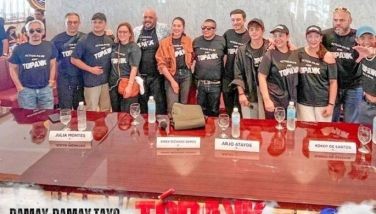Reese And Joaquin: In 'Walk the line'
February 8, 2006 | 12:00am
When Joaquin Phoenix met Johnny Cash about five years ago, the young actor had no idea that one day he'd be playing the music legend. "We were at a friend's place in L.A.," Phoenix says. "We went into the living room after dinner, and he comes in-his hands were shaking really bad by then-and he picks up his guitar, and the moment he touches the strings, the shake is gone." After Cash's wife, June, joined him, the two sang "I Stood on the Banks of Jordan" together. "It was one of the most special moments of my life," Phoenix says.
But the big thrill came later, when Phoenix learned that Cash was a fan of his Oscar-nominated performance as the evil emperor in "Gladiator." "I'm leaving, and he says," and here Phoenix's voice drops an octave into Cash's country lilt, "I really loved that 'Gladiator.' I really like the way you say, 'Your wife moaned like a whore as they ravaged her again and again and again'." Phoenix laughs: "That's the duality of Johnny: he was very, very family-oriented, and yet he was also a s-kicker."
The man in full is visible (and audible) in "Walk the Line," a new film about Cash's life, directed by James Mangold ("Girl, Interrupted") and starring Phoenix as Cash and Reese Witherspoon as June. The film tracks Cash from his hardscrabble youth as the son of an Arkansas cotton farmer to his rise as the iconic Man in Black, racking up hits from "Ring of Fire" to "Folsom Prison Blues."
But beneath the glory of the music, Cash is becoming an absentee husband to his first wife, Vivian (played powerfully by Ginnifer Goodwin), and an amphetamine addict. Cash is also desperately in love with June Carter, a beautiful country singer-comedienne. They perform together often, but June is deeply religious and rebuffs Cash's advances for more than a decade because she can't bear the idea of breaking up his family. It's that long-unrequited love story that forms the heart of "Walk the Line." "There's something really magical about the idea that the only place they were allowed to be alone together was onstage in front of 10,000 people," Mangold says. "I saw those songs they sang together as love scenes."
While "Walk the Line" is ultimately uplifting-Johnny beats his addiction, reaches a peace with his emotionally distant father and finally persuades June to tie the knot-the film is shaded by darkness. Cash was haunted by the loss of his older brother, Jack, who died from a wood-sawing accident at 14; Johnny was 12.
It's tempting to see a parallel to Phoenix's life. His older brother, River, died of a drug overdose in 1993, when Joaquin was 19. Phoenix does share Cash's addiction problems-he checked himself into rehab for alcohol abuse earlier this year-but, as for any other connection between his life and Cash's, Phoenix is calm but emphatic: he doesn't see it. "That's not the way my brain works," he says. "You know, the press has kind of imposed upon me the title of Mourning Brother, and because I haven't been vocal about it, the assumption is that I'm holding onto it and all this s-t that's just not there. I don't need to pull from my experience for a character, and I've never understood why actors would, except for lack of ability, imagination or research. I had all three things, so this is a little frustrating to me, because it denies my work and the research that I did." He pauses. "It bothers me that this happens, because it's slightly exploitative. Suggesting that I would use this personal part of my life for a f-ing movie ... it kind of makes me sick."
Besides, the 30-year-old actor has never worked so hard to transform himself into a character. He and Witherspoon, 29, do their own singing in "Walk the Line," despite never having sung in public before. They worked with T-Bone Burnett, composer for "O Brother, Where Art Thou?" and "Cold Mountain," and with vocal and instrument coaches for more than five months, often eight hours a day. Phoenix mastered Cash's guitar strum, and learned to sing 26 songs in Cash's signature voice.
Witherspoon tapped into her own Nashville roots (and accent) to play June, but also had to learn the autoharp. "As an actor, complacency is death to your career, and it's important to scare yourself," Witherspoon says. "This is the biggest challenge I've ever had to conquer. It was crazy! Joaquin and I kept looking at each other, like, 'Are we really doing this?'" Yep. And doing it so well that Oscar nominations for both of them seem inevitable.
"Joaquin was not going to get the movie made at a major studio price," producer Konrad says. And Witherspoon, while a virtual ATM in comedies, hadn't proved herself a draw in a drama. Although the film eventually found a home at Twentieth Century Fox, Mangold and Konrad still had to keep the budget to a very tight $28 million. It could prove to be the best bargain of the year. After this movie, neither actor will be that affordable again. - Sean Smith /Newsweek
But the big thrill came later, when Phoenix learned that Cash was a fan of his Oscar-nominated performance as the evil emperor in "Gladiator." "I'm leaving, and he says," and here Phoenix's voice drops an octave into Cash's country lilt, "I really loved that 'Gladiator.' I really like the way you say, 'Your wife moaned like a whore as they ravaged her again and again and again'." Phoenix laughs: "That's the duality of Johnny: he was very, very family-oriented, and yet he was also a s-kicker."
The man in full is visible (and audible) in "Walk the Line," a new film about Cash's life, directed by James Mangold ("Girl, Interrupted") and starring Phoenix as Cash and Reese Witherspoon as June. The film tracks Cash from his hardscrabble youth as the son of an Arkansas cotton farmer to his rise as the iconic Man in Black, racking up hits from "Ring of Fire" to "Folsom Prison Blues."
But beneath the glory of the music, Cash is becoming an absentee husband to his first wife, Vivian (played powerfully by Ginnifer Goodwin), and an amphetamine addict. Cash is also desperately in love with June Carter, a beautiful country singer-comedienne. They perform together often, but June is deeply religious and rebuffs Cash's advances for more than a decade because she can't bear the idea of breaking up his family. It's that long-unrequited love story that forms the heart of "Walk the Line." "There's something really magical about the idea that the only place they were allowed to be alone together was onstage in front of 10,000 people," Mangold says. "I saw those songs they sang together as love scenes."
While "Walk the Line" is ultimately uplifting-Johnny beats his addiction, reaches a peace with his emotionally distant father and finally persuades June to tie the knot-the film is shaded by darkness. Cash was haunted by the loss of his older brother, Jack, who died from a wood-sawing accident at 14; Johnny was 12.
It's tempting to see a parallel to Phoenix's life. His older brother, River, died of a drug overdose in 1993, when Joaquin was 19. Phoenix does share Cash's addiction problems-he checked himself into rehab for alcohol abuse earlier this year-but, as for any other connection between his life and Cash's, Phoenix is calm but emphatic: he doesn't see it. "That's not the way my brain works," he says. "You know, the press has kind of imposed upon me the title of Mourning Brother, and because I haven't been vocal about it, the assumption is that I'm holding onto it and all this s-t that's just not there. I don't need to pull from my experience for a character, and I've never understood why actors would, except for lack of ability, imagination or research. I had all three things, so this is a little frustrating to me, because it denies my work and the research that I did." He pauses. "It bothers me that this happens, because it's slightly exploitative. Suggesting that I would use this personal part of my life for a f-ing movie ... it kind of makes me sick."
Besides, the 30-year-old actor has never worked so hard to transform himself into a character. He and Witherspoon, 29, do their own singing in "Walk the Line," despite never having sung in public before. They worked with T-Bone Burnett, composer for "O Brother, Where Art Thou?" and "Cold Mountain," and with vocal and instrument coaches for more than five months, often eight hours a day. Phoenix mastered Cash's guitar strum, and learned to sing 26 songs in Cash's signature voice.
Witherspoon tapped into her own Nashville roots (and accent) to play June, but also had to learn the autoharp. "As an actor, complacency is death to your career, and it's important to scare yourself," Witherspoon says. "This is the biggest challenge I've ever had to conquer. It was crazy! Joaquin and I kept looking at each other, like, 'Are we really doing this?'" Yep. And doing it so well that Oscar nominations for both of them seem inevitable.
"Joaquin was not going to get the movie made at a major studio price," producer Konrad says. And Witherspoon, while a virtual ATM in comedies, hadn't proved herself a draw in a drama. Although the film eventually found a home at Twentieth Century Fox, Mangold and Konrad still had to keep the budget to a very tight $28 million. It could prove to be the best bargain of the year. After this movie, neither actor will be that affordable again. - Sean Smith /Newsweek
BrandSpace Articles
<
>
- Latest
- Trending
Trending
Latest
Trending
Latest
Recommended























